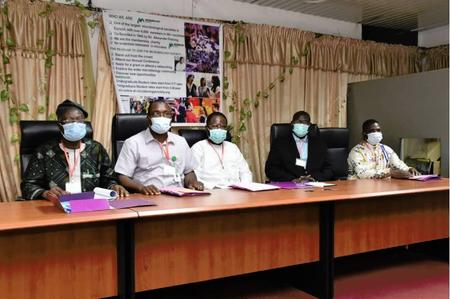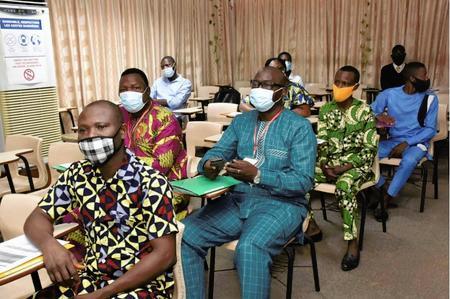The contribution of microbiology to public health challenges
The event featured participants from Benin, Burkina Faso, Togo, Senegal, Denmark, the United States of America and Sweden. Opening addresses were given by former Microbiology Society Champion Dr Philippe Sessou, Professor Joseph Hounhouigan (President of the Symposium's Scientific Committee), Professor Guy Alain Alitonou (Director of the Polytechnic School of Abomey-Calavi) and Professor Aliou Saidou, the Rector's representative from the University of Abomey-Calavi.
These opening speeches began by thanking the Microbiology Society for providing funding for this event and Nathalie Persson Andrianasitera (Scientific Coordinator of the Program of Support to the Research in Food Sciences and Nutrition at the International Foundation for Science), for her presence and support, and to the scientific and organising committees.
Next, the symposium’s theme ‘Contribution of Microbiology to the challenges of Public Health’ was introduced. The COVID-19 pandemic has highlighted the need for more collaboration between researchers from around the world. This would strengthen the capacity of researchers in Benin and it’s neighbouring countries in the field of microbiology research, and would contribute to the achievement of the Sustainable Development Goals in both ‘Good health and well-being' and ‘Partnership for the goals’.
The results presented during this symposium will help identify urgent solutions to the many health crises including antimicrobial resistance, new and emerging diseases and food safety challenges.
After the opening speeches took place, Dr Sessou introduced the Microbiology Society and highlighted five reasons for joining the Society. Following this, an inaugural lecture was given by Persson Andrianasitera. Her lecture, titled 'International Foundation for Science (IFS) and its support of young researchers in microbiology and food safety in low- and middle-income countries’, focused on the genesis of IFS and on its role in supporting junior researchers in low- and lower-middle-income countries by awarding individual and collaborative research grants. She also outlined why IFS grants contribute to the reinforcement of the research capacities of young scientists and allow the selected candidates to contribute by their research results to provide solutions to the challenges facing their locale without excluding the global level. She ended her talk by giving examples of projects that have produced innovative results in Africa and urged young researchers and participants in the symposium to create a credible profile in science and research, to gain visibility in the academic arena and publish in good journals to convince politicians and decision-makers. This symposium theme caught participants' attention and allowed participants to identify the IFS programs' impact during the comments and questions period.
After a coffee break, the oral presentations focused on antimicrobial resistance (AMR). This session was moderated by Professor Baba-Moussa Lamine. All works presented during this session focused on the resistance of Enterobacteriaceae, in particular Escherichia coli, Salmonella spp and Klebsiella pneumoniae strains to antibiotics that were isolated in salad, poultry, wastewater and infantile diarrhoea samples in Burkina Faso.

Next, participants were treated to a plenary lecture by Dr Sylvain Dabade on ‘Predictive microbiology and food quality management in Africa’. Dr Dabade emphasised that Predictive Microbiology (PM) is the branch of food microbiology that quantitatively evaluates the behaviour of micro-organisms in foods in order to derive adequate mathematical models, which describe the behaviour of micro-organisms in terms of their growth, inactivation and ability to produce toxins and germinate. He then pointed out that PM offers an alternative to the traditional microbiological assessment of food quality, such as shelf-life tests and challenge tests. These models are used to support food quality management decisions and can be applied throughout the supply chain to determine what can happen in many different scenarios. According to the speaker, PM is based on the assumption that the responses of micro-organisms to environmental factors are reproducible and, therefore, past observations can be used to predict future responses of micro-organisms to environmental factors. There are three types of models in PM:
- Primary models that describe changes in a microbial population as a function of time under given environmental conditions
- Secondary models that describe changes in kinetic parameters (e.g. growth rates) as a function of environmental factors (e.g. temperature)
- Tertiary models that contain both primary and secondary models in user-friendly decision support systems that are software.
Dr Dabade concluded by diagnosing that for the development of predictive microbiology in Africa, it will be necessary to proceed with the capacity building of researchers in the field, to communicate around the theme and to benefit from a significant support for research in the field of PM.
Following this, a panel discussion focused on the microbiological characterisation (identification of specific micro-organisms of alteration and pathogens) of Wagashi cheese and Akandji, two traditional products sold and consumed in Benin, in addition to foods sold in collective catering in schools in Benin and the evaluation of technological properties of Bacillus strains isolated from a traditional local drink of Burkina Faso. This session was chaired by Professor Honoré. This was followed by a second panel discussion, chaired by Professor Souaïbou Farougou and assisted by Dr Nestor Noudeke. Four talks were given on various subjects including in vivo study of the virulence of a telluric strain of Candida tropicalis according to the Galleria mellonella model, the identification of Campylobacter strains isolated from patients consulted in private laboratories in France, bacterial resistance and phytomolecules from Desmodium ramosissimum and the evaluation of the clarifying and antibacterial potential of Moringa oleifera extracts on well water in the commune of Parakou in Benin.
The second day of the symposium was opened by two plenary lectures from Professor Farougou and Dr Gildas Hounmanou on ‘The emergence of micro-organism resistance to antibiotics: a challenge for the preservation of public health, animal health and environmental health’ and ‘Applying whole genome sequencing in One Health studies.’ Professor Farougou, highlighted that the abusive use of the front-line antibiotics for therapeutic use in the early 1940s has generated resistance mechanisms against new antibiotics. The World Organisation for Animal Health (OIE) has assessed the National Animal Health Systems of 130 countries and concluded that more than 110 countries do not yet have appropriate legislation to regulate the importation, manufacture, distribution and use of antimicrobial agents, resulting in a very complex problem of antimicrobial resistance. To address this problem, he said, a multisectoral approach based on One Health as well as increased innovation and investment in operational research and development of new antimicrobial drugs, vaccines, and diagnostic tools is essential.

Participants at the in-person Symposium
Next, Dr Hounmanou, through a brilliant presentation, demonstrated that whole genome sequencing (WGS) has a highly discriminating ability to compare genetic relatedness and has become an effective and increasingly cheap method to study the information contained in the genome sequence of microbial pathogens. He further indicated that WGS is currently being implemented worldwide and in all sectors of the ‘One Health’ initiative (human medicine, veterinary medicine, food, environment, antimicrobial resistance) for the study of outbreaks (such as the current SARS-CoV-2 pandemic), source attribution (in foodborne diseases), and improved risk characterization models. To illustrate the application of WGS, the speaker presented the various research results he has obtained over the past four years using short-read (Illumina) and long read (Oxford Nanopore) WGS platforms to conduct a variety of genomic studies over many spatiotemporal periods. He further recommended that genomic studies should always be coupled with phenotypic and biological studies and supported by strong epidemiological data.
On the second day, the IFS Director, Dr Nighisty Ghezae, underlined that in today's COVID-19 health crisis, the symposium highlighted the necessity for more collaboration between researchers from around the world and this collaboration would strengthen the capacity of researchers in Benin and its neighbouring countries in microbiology research and contribute to the achievement of the Sustainable Development Goals in both ‘Good health and well-being' (Goal 3) and ‘Partnership for the Goals’ (Goal 17).
This was followed by a series of presentations centered on infectious diseases including tuberculosis, human and animal Hepatitis E, genital infections and meningitis. The debates were fruitful and helped to improve the authors’ results.
Panels moderated by Professor Baba-Moussa Farid and Doctor Cyrille Boko took place that afternoon and included a plenary talk, given by Doctor Haziz Sina-Orou, on molecular biology techniques used for the quick identification of micro-organisms during emergencies.
Following this presentation, four talks were given with the vast majority of them focusing on the COVID-19 pandemic, particularly the issue of compliance with COVID-19 preventive measures in the health facilities of the city of Parakou. Dr Angelo Cossi Attinsounnon showed that there is a disparity in the implementation of preventive measures and the respect of barrier measures in the health facilities of Parakou.
The second presentation on COVID-19 was given by Dr Sessou on the perceptions and acceptance of COVID-19 vaccination by the general public in Benin. His presentation showed that 22.64% to 48.43% of respondents agreed to be vaccinated with vaccines that are at least 90% effective if they were available. He pointed out that 100% of the respondents did not accept vaccination of children against COVID-19 regardless of the efficacy rate. He ended his presentation by showing that the reasons underlying the rejection of vaccines by some participants included the possible side effects of vaccines, the absence of vaccines against well-recognized diseases in the community such as malaria and AIDS, and the distrust and low level of confidence in vaccines from Europe.
After the different scientific communications, Dr Sessou gave a presentation about the African Students and Alumni Forum (ASAF) which is a platform of African students, alumni and professionals who have benefited from international mobility scholarships funded by the European Union and the African Union. According to the presenter, ASAF provides opportunities for exchange, collaboration and capacity building for students, administrative staff and lecturer researchers of African universities. He then indicated that the Forum is organised by volunteer members and is funded and supported by the European Union in close collaboration with the African Union. He ended by stating that the ASAF objectives are to contribute to the political dialogue between the African Union and the European Union, to contribute to the sustainable development of Africa, to strengthen the skills of youth in networking, innovation, participation, leadership and employability, to improve the participation of students and alumni in educational processes, strengthening the links between higher education and the labour market, to promote dialogue and networking among stakeholder associations on issues of common interest, to raise awareness of international mobility opportunities, and more.
The final lecture of the Symposium was given by Dr Deborah Thomson, Founder and President of One Health Lessons in the United States. Speaking from the perspective of an educator, veterinarian, and One Health policy advisor, Dr Thomson focused her presentation on antimicrobial resistance, alternatives to antibiotics, and current gaps in global health education. She outlined techniques to address these gaps.
Over the course of two days, the symposium covered 38 scientific paper presentations. The works concerned various timely and sensitive areas of research such as emerging diseases, antimicrobial resistance, food safety, and One Health.
Despite our scarce resources and environmental hazards, high-level scientific work is being undertaken in Africa and the quality of the results obtained demonstrates that the objectives for sustainable development can be achieved if Africans obtain more funding from the political authorities of their countries and donors.
The speeches (in French) can be accessed on YouTube at the following links:
https://www.youtube.com/watch?v=yt1HouE3gIc
https://www.youtube.com/watch?v=PvBkWWwBkL0
https://www.youtube.com/watch?v=jYMGFWEH7jM&t=282s
https://www.youtube.com/watch?v=6gPdUzLKA_4&t=459s
https://www.youtube.com/watch?v=pHLq3y0Yzro
https://www.youtube.com/watch?v=kr5jePGSuY0
https://www.youtube.com/watch?v=OouFxYmqAng&t=225s
https://www.youtube.com/watch?v=ehGSVXabYAU&t=803s
https://www.youtube.com/watch?v=qUb5lvGFek8
https://www.youtube.com/watch?v=ZdOt6gsRo-w&t=6s
Image: Colloquium Launching Committee (from left to right Professor Joseph Hounhouigan (President of the Scientific Committee), Professor Aliou Saidou (Representative of the Rector), Professor Guy Alain Alitonou, (Director of EPAC), Professor Lamine Baba-Moussa(Member of the Scientific Committee), Dr Philippe Sessou (Organiser)
